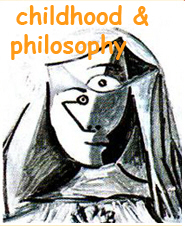idade dos alunos e praxis filosófica: dois fatores que influenciam o desenvolvimento do pensamento crítico das crianças
Palavras-chave:
Philosophy for children, Dialogical critical thinking, Epistemological perspectives, Preschool and Elementary schoolResumo
Um dos objetivos fundamentais da Filosofia para crianças (P4C) é o desenvolvimento cognitivo dos alunos. Nesse texto, nós estudaremos em que medida a idade das crianças e o número de anos de sua praxis filosófica influenciam o desenvolvimento de seu pensamento critico. Os participantes eram grupos de alunos (vs. os indivíduos): 13 grupos frequentam classes do pré-escolar ao fim do primário. Esses grupos eram de duas escolas, situadas respectivamente no Quebec e em Ontario. Os grupos da escola quebequense tinham um ano de práxis com a P4C no momento da colheita de dados; os grupos da escola de Ontario tinham dois anos de práxis. O conteúdo analisado era feito das trocas filosóficas entre os alunos. Como grade de análise, nós utilizamos o modelo do processo de desenvolvimento de um pensamento crítico dialógica (PCD). O modelo inclui quatro modos de pensamento (lógico, criativo, responsável e meta-cognitivo) e seis perspectivas epistemológicas (egocentrismo, postegocentrismo, pré-relativismo, relativismo, post-relativismo/pré-intersubjetividade e intersubjetividade). Ressaiu durante as análises das trocas, no que refere aos modos de pensamento, que a idade pode ter tido uma incidência sobre a mobilização do modo lógico e o número de anos de práxis filosófica poder ter tido uma incidência sobre a mobilização do modo meta-cognitivo, mas em nenhum dos casos estudados, esses fatores puderam ser colocados como sendo particularmente determinantes. No que refere ao desenvolvimento epistemológico, os resultados indicam que o fator da idade é observável pela ausência ou a fraca mobilização das perspectivas mais complexas (relativismo, post-relativismo) nos grupos do pré-escolar e do começo do primário. E o fator ligado ao número de anos de praxis é observável no movimento de complexificação do PCD. Nos grupos que têm um ano de praxis filosófica, a passagem das perspectivas simples como o pré-relativismo às perspectivas mais complexas como o relativismo ou o post-relativismo se efetuou no 4o ano, quando nos grupos que tinham dois anos de praxis, operou no 3o ano, ou seja um ano antes.Downloads
Não há dados estatísticos.
Downloads
Publicado
2012-06-10
Como Citar
DANIEL, Marie-france; GAGNON, Mathieu. idade dos alunos e praxis filosófica: dois fatores que influenciam o desenvolvimento do pensamento crítico das crianças. childhood & philosophy, Rio de Janeiro, v. 8, n. 15, p. 105–130, 2012. Disponível em: https://www.e-publicacoes.uerj.br/childhood/article/view/20740. Acesso em: 9 maio. 2025.
Edição
Seção
artigos




